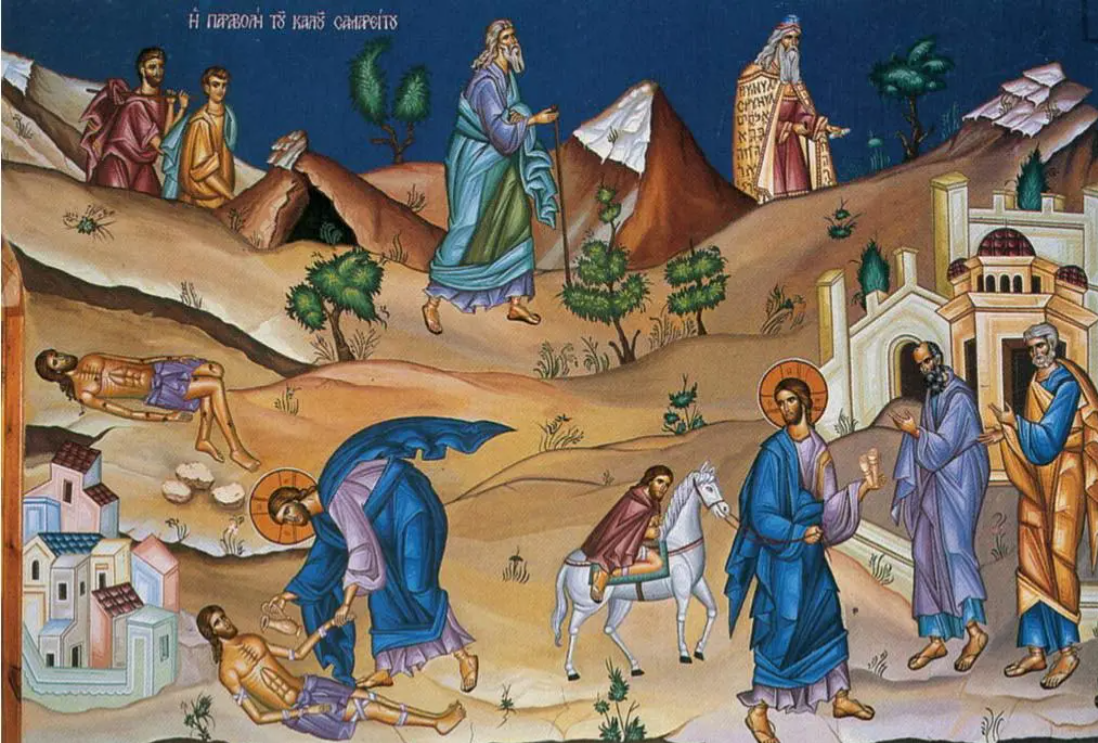Luke 10:25-37 2023/11/26 Osaka Church
In the name of the Father and the Son and the Holy Spirit.
When the scribe asked the question, “How can I receive eternal life?”, the Lord Jesus urged him, “If you are a scribe, look for the answer in the law.” He followed by saying, “Love God with all your might, and love your neighbor as yourself.” the Lord declares simply. In response, the scribe asked another question, “Then who is my neighbor?”
Jesus’ answer to that question is the “Parable of the Good Samaritan” that we read today. As the traveler lay half-dead after being attacked by robbers, the Jewish priests and Levites who were supposed to be his compatriots walked past him, coming up with some kind of excuse. But contrastly, one of the Samaritan who had hated the Jews for a long time felt sorry for him, so he took care of him and helped him. He overcame hatred and hostility and practiced love.
At the end of the parable, the Lord asks the scribe, “Who has become this poor man’s neighbor?” At first the scribe asked Jesus, “Who is my neighbor?”. Jesus used this whole parable to evade this scribe’s question, and in the end he replaced his question with another. The scribe must have expected an answer along the lines of, “Your neighbors are your fellow Jews,” or “those who know the law well and keep it.”
However, the Lord did not answer like that. The Lord is teaching us that as long as we are self-centered and ask, “Who is my neighbor?” (Who is neighbor for me?), we will never find a neighbor. To go into more detail, we think of ourselves as the center of everything, thinking, “What’s in it for me,” and only look at the people we meet in this world with an interest in “What’s in it for me?” Consequently, we lose the concept of “neighbors” and live in isolated loneliness, almost dying within our solitary confines, just like the wounded traveler in this parable, nearly dying in loneliness.
The Lord ignores the scribe’s question and instead asks, “Who became this man’s neighbor?” The focus here is not on yourself but on “this person.” Love is knowing other people’s needs (not this person’s “demands”) and meeting those needs. Often, we seek to create a comfortable image of “practicing neighborly love” by giving money or material things when comforting words are needed, or vice versa. However, all these actions are merely a desire to project a comfortable image of “practicing neighborly love.” They just want to project an image. As long as this is the case, we will not be able to create new things within each other as neighbors, and we will not be able to “become neighbors.” It’s a mistake we’re all too familiar with. We must give up our obsession with searching for what that person is to us, and continue to prayerfully ask ourselves what we can be for that person. That is the original human nature that God has given to humans.
However, people have lost their way of being and are stuck in what could be called a “hell of solitude” where they constantly say “Me, me, me”. Hell is no longer hell if you have friends. In this parable, people are literally lying half-dead on the side of the road, unable to move.
“Feeling sorry for us,” God sent His Son, Christ, to us. That Christ stands here to make us his neighbors.
The scribe asked Jesus the question,”How can I get eternal life”. The one who is the very “eternal life” that we are also thirsting for, stands before us as Jesus Christ and invites us thus:
“I know your needs. You need me. Believe in me, surrender to my love, and make me your first neighbor.”

